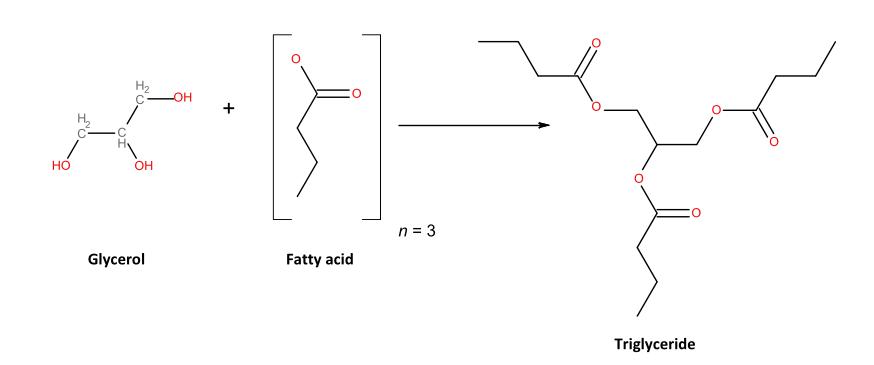Lifeasible specializes in milk fat-related testing and offers services to help determine the free fatty acid content of milk fat to help determine the freshness of milk and milk products.
The fat in milk consists mainly of triglycerides. Triglycerides are composed of glycerol and fatty acids (Fig. 1). When a fatty acid is not bound to glycerol, it is termed a free fatty acid. Free fatty acids are mainly formed in milk and milk products by the enzymatic breakdown of glycerides, such as triglycerides. As storage time increases, the free fatty acids in milk and milk products increase. Elevated short-chain free fatty acids can lead to rancidity in milk and other dairy products. Therefore, determining free fatty acids in milk and milk products can indirectly reflect their freshness. Lifeasible offers services to help determine the free fatty acids in milk and milk products to assist in determining their freshness.
 Fig. 1 Formation of triglycerides (Mannion et al., 2016).
Fig. 1 Formation of triglycerides (Mannion et al., 2016).
We offer two methods for determining free fatty acid content in milk and milk products, both based on the titrimetric determination method.
Alcohol alkali titration method
The method applies to the determination of free fatty acids in raw milk, heat-treated milk, milk powder reconstituted milk, and milk products (e.g., cream). When determining high-fat-content milk products, care must be taken to dilute the sample to obtain a mass fraction of between 4 % and 6 % fat. In addition, the method does not apply to fermented milk or milk that has undergone bacterial or enzymatic destruction.
The method requires the extraction of fat, which is then dissolved in an organic solvent and titrated using alcoholic alkali.
Operation flow:

Main reference standard:
ISO/TS 22113:2012
Tetra-n-butylammonium hydroxide titration method
The method is applicable to milkfat products and butter.
This method requires thymol blue as an indicator. These samples needed to be melted and centrifuged to separate the fat, and the fat obtained is dissolved in a mixture of propan-2-ol and light petroleum after filtration and then titrated using a standard solution of tetra-n-butylammonium hydroxide.
Operation flow:
The operation flow is similar to the alcohol alkali titration method.
Main reference standard:
ISO 1740:2004
Sample delivery:
Milk powder can be delivered at room temperature. Milk, cream, and milk fat test samples should be delivered at 0°C to 4°C. For long time delivery, it is recommended to use a final concentration of 0.2 g/L H2O2 to preserve test samples.
We have professional and automated fatty acid titration instruments for efficient titration of free fatty acids in milk and milk products.
Lifeasible specializes in milk-related testing. Not only do we provide free fatty acid content testing services based on international standards, but we also provide free fatty acid composition analysis services. Please do not hesitate to contact us if you have these needs.
References
Lifeasible has established a one-stop service platform for plants. In addition to obtaining customized solutions for plant genetic engineering, customers can also conduct follow-up analysis and research on plants through our analysis platform. The analytical services we provide include but are not limited to the following:
Get Latest Lifeasible News and Updates Directly to Your Inbox
Mechanisms Regulating Plant Chloroplast Biogenesis
April 15, 2025